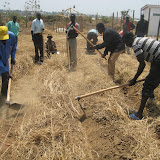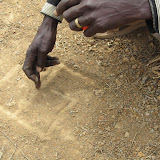This week I (Diantha) went a second time to Lasu near the Congo border with some colleagues from UMCOR (United Methodist Committee on Relief) who were going back to see the Congolese refugee camp and the UMCOR work there (a bumpy 1 ½ hour drive; a few weeks ago we were at the opening of the school). I wanted to go in order to see the government health center that UMCOR helped by improving the existing building and giving supplies for the midwife there. They have free care and medicines (not all centers actually have staff and medicines). This health center which is the only health facility for miles, is staffed by a medic who sees sick people, gives immunizations, dispenses from their simple pharmacy, and is in the future supposed to provide preventive health education in the community. They have one medical bed (see photo).The midwife does maternity education and care, including births for which UMCOR brought thermometers, a birthing bed (behind the screen in the maternity room in photo), BP cuff, simple supplies for births, fetascope, and otton cord to tie the baby's cord. They already had gloves. Many rural centers like these have little to no supplies for births. And even here in Yei, a city of over 200,000, women who go to the government hospital must bring gloves, a cord tie, and everything for the birth. The midwife at Lasu said the mother is only supposed to bring a blanket to clean the baby with and take it home, except even then she often has nothing, and the baby goes home naked, or she cuts one of her blankets or sheets to use.
At the Lasu refugee camp we also saw the schools, with a metal roof supplied by Across, a Christian NGO, and bamboo half size wall built locally. UMCOR was pouring the concrete floors for the school. I am told the refugees have enough food for 2 to 3 meals a day (more than many Sudanese have). The children were dressed sometimes in shreds of clothes, but had a happy smile for us. They were growing rice (not the wet paddy kind) and other things in their gardens. Agencies are providing additional food, a medical center and schools for them, and uniforms, which are bright, new and whole garments.
Yesterday we had a long service at Mirodu UMC, a rural church, for "Pastor's Forum", an event where all the Sudanese pastors are try to visit one different church a month, and have a special service. It was also World Communion Sunday, which for us was a nice connection. There were baptisms of 4 infants, and Boo and Phyllis were asked to serve communion (see photos). These are new practices for the pastors, so they do not yet seem to feel confident to do them on their own. Communion was an easily accessible cracker, with water in a tin cup. There is some bread here, but no grape juice. It was very moving. All the visitors were asked to introduce themselves, and I also mentioned it was World Communion Sunday and that my pastor brother Dave had talked to me just the day before asking how we celebrate communion, and for some ideas to share with his congregation. I told them many, many people would be praying for them that day!! Boo did a nice job in explaining communion and the about the New Covenant. He explained Passover, when the Israelites were freed from slavery, as the Old Covenant. There were some flowers on the alter table, in a reused plastic soap container. So he made a demonstration out of it, saying the use of this soap container is now made new, just as Jesus gave a new meaning to Passover when he began the Last Supper. They also had a time for prayers for those who need healing. Those who are ill or are representing sick family member come and stand or kneel in front. Others lay hands on them, pray and anoint them with oil. Usually Phyllis heads this up. The last team that visited gave anointing oil to all the pastors. So this time, Phyllis deliberately stepped back and the pastors did the praying. Progress!
While we were at the church, we brought 2 blackboards Holston Conference had provided for the church’s nursery/primary school made up of 5 classes (see photo). These are the only supplies for these schools (even the teachers do not have books to teach from). Schools here are operated out of school fees, but in the rural church schools, pupils do not have the fees, for the most part, so teachers are volunteers. Later in the week Steve and I rode our motorcycles, and Sebit, the Sudanese Assistant to the Superintendent and interpreter, accompanied us to visit Morre UMC, the newest rural United Methodist church. Steve was asked to preach once we arrived. On the spur of the moment he gave a great sermon based on Jesus feeding the five thousand, how Jesus needed the people to come up with the little they had, to step out in faith in spite of an overwhelming task. They have 5 classes covering 7 grade levels in their school, and are constructing a second thatch structure to use for school in addition to the church structure (see photo). We were also excited to see that at the school structure they had erected a “tippy tap” for hand washing, a simple device which we introduced at the health and sanitation workshop last month. Several pastors mentioned they have made them, and Pastor Mukasa of Morre showed us the one he had made (see photo.) It encourages hand washing (which isn’t practiced often, especially with soap) using very little water. The church had beautiful church gardens (see photo), using the tools and some seeds that were donated. We are encouraged by all of these signs of advancement.
The 1 ½ hour motorcycle ride is a story in itself, especially since it was our first ride out of town. The main Kaya road had been worked on in spots, so we were able to reach a top speed of 25 miles an hour. We cut off that road and went about 4 miles down what you could call a lane with one or two tracks, with tall grasses on either side, rocks in the road and mud holes. The motor bike spilled only two times (we were unhurt, as the speed was about 2-3 mph, but got muddy). The scenery was beautiful, and we passed a few tall stone hills which just rise abruptly out of the ground. One time when we were stopped with the motors off, I heard about 5 kinds of birds at once (we see/hear just a few birds here in town). On the return trip it looked like the skies would open up with rain, and the drops were starting as we approached home and made our way carefully through the small herd of cattle taking up the road!! In addition, Steve got the stomach flu during the visit (he is almost better now), but had the ability to drive the motorcycle home. Our prayers were answered and we arrived safely.
This is my one year anniversary of being diagnosed with breast cancer. I am celebrating with thanksgiving for healing and continued health, and putting the experience farther behind me. October is breast cancer awareness month, so I will add my voice to remind women to do self breast exams. Thirty minutes of exercise a day (or 2 ½ hours total per week), eating preventive foods, plenty of vitamin D (at least 30 min. a week of sunshine exposure; most people probably need supplements) are good preventive measures. Celebrate the health, family and friends that you have!! Many of us can be thankful for access to a cleaner immediate environment, health care and medicines, unlike the situation here in Sudan for so many.
Tuesday, October 12, 2010
Subscribe to:
Post Comments (Atom)
















No comments:
Post a Comment